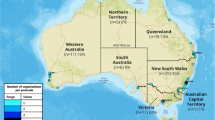Abstract
Introduction
Patients with cancer are frequently turning to complementary medicine (CM), often with the goal of improving quality of life outcomes. The purpose of the present study was to assess the adherence of patients referred by oncology practitioners to a CM consultation and treatment program.
Patients and methods
A prospective registry protocol-based, preference study was conducted at a conventional oncology department. Patients undergoing chemotherapy were referred by participating oncology practitioners to a CM-trained integrative physician (IP) for consultation. Adherence to the integrative care (AIC) program was defined as attendance by patients at ≥4 CM treatment sessions, with an interval of no more than 30 days between each session.
Results
A total of 282 patients were referred by the study health-care professionals (HCPs), of whom 243 (85.8 %) were eventually seen by the study IP. Of these, 160 were found to be adherent to the treatment plan (AIC group), and 83 were nonadherent (non-AIC group). No significant differences were found between the two groups with respect to demographic characteristics, medical history, site of malignancy and/or recurrence, chemotherapy regimen, or severity of symptoms at baseline. The AIC group reported significantly greater rates of CM use for noncancer-related indications than the non-AIC group (EXP(B) = 2.174, 95 % confidence interval (C.I.) = 1.1–4.295, p = 0.025). Patients in the non-AIC group were referred more frequently by their HCP for gastrointestinal concerns than those in the AIC group (p = 0.022).
Conclusions
Previous use of CM for noncancer-related outcomes was found to be predictive of patient adherence to a CM treatment regimen provided within conventional oncology service.
Similar content being viewed by others
References
Navo M, Phan J, Vaughan C, Palmer J, Michaud L, Jones K, Bodurka D, Basen-Engquist K, Hortobagyi G, Kavanagh J, Smith J (2004) An assessment of the utilization of complementary and alternative medication in women with gynecologic or breast malignancies. J Clin Oncol 22(4):671–677
Gansler T, Kaw C, Crammer C, Smith T (2008) A population-based study of prevalence of complementary methods use by cancer survivors: a report from the American Cancer Society’s studies of cancer survivors. Cancer 113(5):1048–1057
Frenkel M, Cohen L, Peterson N et al (2010) Integrative medicine consultation service in a comprehensive cancer center: findings and outcomes. Integr Cancer Ther 9(3):276–283
Deng G (2008) Integrative cancer care in a US academic cancer centre: The Memorial Sloan-Kettering Experience. Curr Oncol 15(Suppl 2):s108, es68-71
Seely D, Weeks L (2012) A systematic review of integrative oncology programs. Curr Oncol 19:e436–e461
Deng G, Frenkel M, Cohen L et al (2009) Evidence-based clinical practice guidelines for integrative oncology: complementary therapies and botanicals. J Soc Integr Oncol 7(3):85–120
Gaboury I, April KT, Verhoef M (2012) A qualitative study on the term CAM: is there a need to reinvent the wheel? BMC Complement Altern Med 12:131
Caspi O, Sechrest L, Pitluk HC, Marshall CL, Bell IR, Nichter M (2003) On the definition of complementary, alternative, and integrative medicine: societal mega-stereotypes vs. the patients’ perspectives. Altern Ther Health Med 9(6):58–62
Ben-Arye E, Schiff E, Golan O (2008) Ethical issues in integrative oncology. Hematol/Oncol Clin N Am 22(4):737–753
Ben-Arye E, Schiff E, Zollman C, Heusser P, Mountford P, Frenkel M, Bar-Sela G, Lavie O (2013) Integrating complementary medicine in supportive cancer care models across four continents. Med Oncol 30(2):511
Ben-Arye E, Schiff E, Shapira C, Frenkel M, Shalom T, Steiner M (2012) Modeling an integrative oncology program within a community-centered oncology service in Israel. Patient Educ Couns 89(3):423–429
Ben-Arye E, Schiff E, Steiner M, Keshet Y, Lavie O (2012) Attitudes of patients with gynecological and breast cancer toward integration of complementary medicine in cancer care. Int J Gynecol Cancer 22(1):146–153
Oldenmenger W, de Raaf P, de Klerk C, van der Rijt C (2012) Cut points on 0–10 numeric rating scales for symptoms included in the Edmonton Symptom Assessment Scale in cancer patients: a systematic review. J Pain Symptom Manag 45(6):1083–1093. doi:10.1016/j.jpainsymman.2012.06.007
Paterson C, Thomas K, Manasse A, Cooke H, Peace G (2007) Measure Yourself Concerns and Wellbeing (MYCaW): an individualized questionnaire for evaluating outcome in cancer support care that includes complementary therapies. Complement Ther Med 15(1):38–45
Lazenby M, Khatib J, Al-Khair F, Neamat M (2013) Psychometric properties of the Functional Assessment of Chronic Illness Therapy–Spiritual Well-being (FACIT-Sp) in an Arabic-speaking, predominantly Muslim population. Psycho-oncology 22(1):220–227
Liang S, Yates P, Edwards H, Tsay S (2008) Factors influencing opioid-taking self-efficacy and analgesic adherence in Taiwanese outpatients with cancer. Psycho-oncology 17(11):1100–1107
Moynihan C, Norman A, Barbachano Y, Burchell L, Huddart R, Dearnaley D, Horwich A (2009) Prospective study of factors predicting adherence to medical advice in men with testicular cancer. J Clin Oncol 27(13):2144–2150
Kahn K, Schneider E, Malin J, Adams J, Epstein A (2007) Patient centered experiences in breast cancer: predicting long-term adherence to tamoxifen use. Med Care 45(5):431–439
Neymark N, Crott R (2005) Impact of emesis on clinical and economic outcomes of cancer therapy with highly emetogenic chemotherapy regimens: a retrospective analysis of three clinical trials. Support Care Cancer 13(10):812–818
Frenkel M, Cohen L (2008) Incorporating complementary and integrative medicine in a comprehensive cancer center. Hematol/Oncol Clin N Am 22(4):727–736
Conflict of interest
The authors state that there are neither actual nor potential conflicts of interest, including any financial, personal, or other relationships with other people or organizations whatsoever.
Author information
Authors and Affiliations
Corresponding author
Additional information
The first and second authors equally contributed to this study which was performed as part of the second author’s MD research project in the Faculty of Medicine, Technion-Israel Institute of Technology, Haifa, Israel.
Rights and permissions
About this article
Cite this article
Ben-Arye, E., Kruger, D., Samuels, N. et al. Assessing patient adherence to a complementary medicine treatment regimen in an integrative supportive care setting. Support Care Cancer 22, 627–634 (2014). https://doi.org/10.1007/s00520-013-2016-z
Received:
Accepted:
Published:
Issue Date:
DOI: https://doi.org/10.1007/s00520-013-2016-z




